This page contains affiliate links. We may earn money or products from the companies mentioned in this post through our independently chosen links, which earn us a commission. Learn More
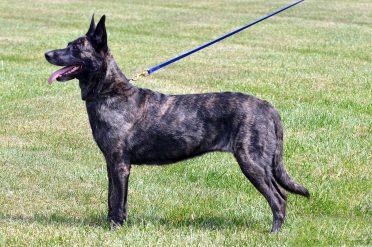 The Dutch Shepherd is a herding dog breed that originated from the Netherlands in the early 1800s. It’s a medium dog breed at about 22 to 24 inches tall at the shoulder, weighing between 65 to 67 pounds. The lifespan of the Dutch Shepherd is around 11 to 14 years.
The Dutch Shepherd is a herding dog breed that originated from the Netherlands in the early 1800s. It’s a medium dog breed at about 22 to 24 inches tall at the shoulder, weighing between 65 to 67 pounds. The lifespan of the Dutch Shepherd is around 11 to 14 years.
Let’s find out more about the Dutch Shepherd, including information about its origins, appearance, and temperament, plus where to buy or adopt one.
Stick with us!
Contents & Quick Navigation
A bit of a background on the Dutch Shepherd
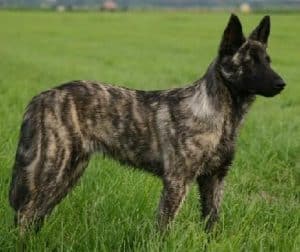
Dutch Shepherds (known as the Hollandse Herder in Dutch) originated in the rural parts of the Netherlands back in the 1800s.
They were used primarily to herd and protect sheep and other livestock as well as to stop them from eating crops and to alert farmers of strangers.
When sheep flocks dwindled at the end of the 19th century, the use of dogs for farming became unnecessary, and the Dutch Shepherd population plummeted.
It was during this time that fans set the first breed standard in 1898 and founded the official breed club, Nederlandse Herdershonden Club.
Thankfully, fans of the breed began to increase its numbers, and this dog is still around to tell the tale today, though the breed remains rare.
What does the Dutch Shepherd look like?
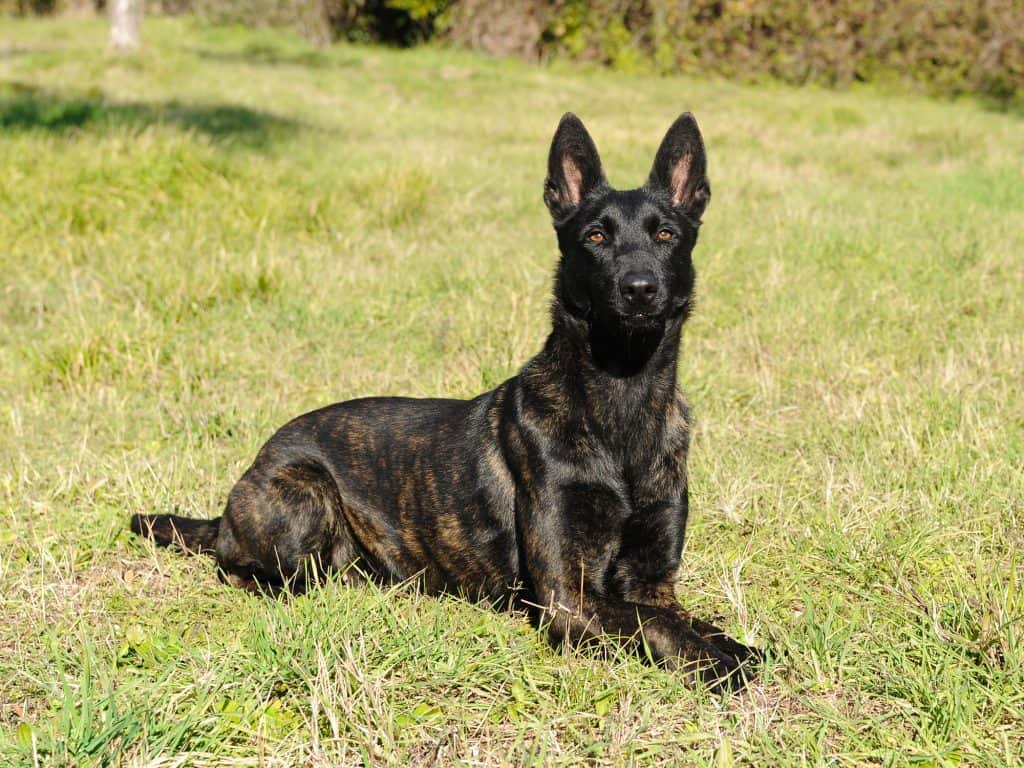
Dutch Shepherds are medium-sized and muscular. Males measure between 22.5 – 24.5 inches (57 – 62 cm) in height and females 21.5 – 23.5 inches (54.5 – 59.5 cm).
Their heads are wedge-shaped, and they have dark, almond-shaped eyes and erect ears.
These dogs have a double coat, consisting of a woolly undercoat and a top coat.
There are 3 outer coat lengths:
Short-haired: smooth and close-lying with a feathered tail
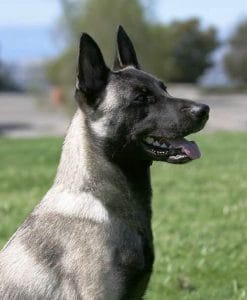
Short-Haired Dutch Shepherd
Long-haired: straight and close-lying; the back of the forelegs are feathered, and the tail is well-covered.
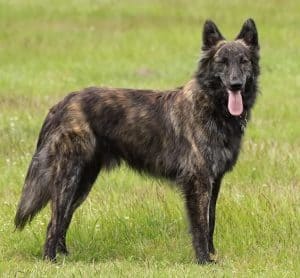
Long-Haired Dutch Shepherd
Wire-haired: rough, tousled hair that forms strong eyebrows on the head and a mustache and beard around the muzzle. The tail is well-feathered.
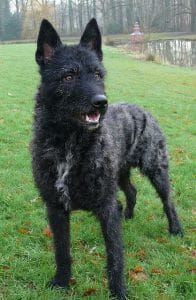
Wire-Haired Dutch Shepherd
Dutch Shepherds always have a brindle coat, which means there is a striped effect. This pattern is usually less pronounced in wire-haired Shepherds.
As for color, they can be any shade of gold or silver brindle, sometimes with some white and black markings.
While it goes against the breed standard, blue Dutch Shepherds are becoming popular. And they’re really quite stunning. See for yourself…
4 Key Dutch Shepherd Character Traits
So now we know a bit about what these dogs look like, but what temperament do they tend to have?
Here are 4 things to know about Dutch Shepherds:
#1 They’ll have your back
First off, like German Shepherds, Dutch Shepherds are incredibly loyal and protective, so they make great dogs for a family. They are also good guard dogs and won’t hesitate to alert you of an intruder.
#2 They’re no couch potato
If you are considering getting a Dutch Shepherd, bear in mind that these dogs have a lot of energy. They tend to be calm when at home, but this is only providing they get at least an hour of vigorous exercise a day.
So, if you’re more of a couch potato, it’s probably best to look for another breed!
#3 They’re seriously smart
Last but not least, Dutch Shepherds are smart! To give you an idea of the level of intelligence we’re talking about, these dogs would herd sheep out to pasture and bring them back to the barn on their own!
So, they are highly trainable and are used as police dogs, guide dogs, and search and rescue dogs.
#4 They get on with one and all
Whether there are children or other animals in the house, these dogs get on with just about everyone.
So, you shouldn’t have to worry about your cat being chased down the road or her ignoring your toddler who just wants to play.
As long as she gets enough socialization and training, Dutch Shepherds tend to be friendly to other animals and gentle and playful with children.
Dutch Shepherd vs. Belgian Malinois
Belgian Malinois and the Dutch Shepherds are both working dogs bred for the same purpose – to work as a shepherd dog. There are a lot of similarities between these dogs that can make telling them apart tricky.
So, here is a breakdown of what they have in common and what they differ on:
Similarities
- Can be short, long, and wire-haired
- Erect ears
- Highly trainable
- Very high energy
- Loyal
- Good watchdogs
- Healthy
Differences
- Dutch Shepherds have brindle stripes of gold or silver, while Belgian Malinois have a range of colors.
- Dutch Shepherds are a little smaller and stockier, while Belgian Malinois are larger with a square-shaped body (of equal length and height).
- Dutch Shepherds are rare, while Malinois are not.
To see a more detailed visual comparison, check out this video:
Dutch Shepherd vs. German Shepherd
Many people think these breeds one and the same due to very similar name. However, physically, Dutch Shepherds differ to German Shepherds by their smaller size, wedge-shaped heads, and brindle coats. German Shepherds also prone to more health problems than Dutchies, such as hip dysplasia.
As for their personality, they do share many traits with German Shepherds – they are loyal, alert, and obedient. However, fans of the Dutch Shepherd claim they have a stronger work drive and are able to work more independently than a German Shepherd, who is more reliant on her handler.
Another difference between these two breeds is the average price for a puppy. German Shepherd pups typically cost between $300 – $900, while Dutch Shepherds fall in the range of $1000 – $1200.
5 Most Popular Dutch Shepherd Mixed Breeds
Dutch Shepherd mixes are becoming more and more popular. Below I have put together a list of the most common mixed breeds along with some info and photos of each. Check them out!
#1 Dutch Shepherd Malinois Mix
These breeds are often crossed. As we have seen, they have very similar temperaments, so there won’t be too many surprises here. Expect high energy, watchdog tendencies, and loyalty.
As for her physical appearance, there may be more variation in color and she’ll probably be slightly larger in size, taking after the Malinois side.
Who could resist this face?
#2 Dutch Shepherd German Shepherd Mix
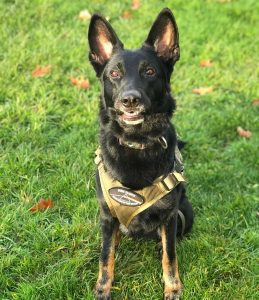
Given the double Shepherd here, you can expect a strong work instinct with this dog. She is active, needing at least 1 hour of vigorous exercise a day. This crossbreed is also very intelligent, so will need a mental workout, as well.
You could give her both at once by taking her to agility classes, where she will burn off energy and be challenged by working out obstacle courses.
To keep her occupied at home, you can also get her some interactive toys to play with.
This dog is loyal to the bone and incredibly protective of her family. She’s great with kids and makes a good watchdog.
#3 Dutch Shepherd Border Collie Mix
We know Border Collies to be rather hyper, right?
Well, cross her with another herding dog, and you’ve got a high energy dog with a strong work drive and impressive intelligence.
So, as with the above crossbreed, lots of exercises, play, and mental stimulation is essential.
This mixed breed is also great with children and just loves to spend time with her family.
#4 Dutch Shepherd Labrador Mix
Everyone loves a Lab.
Mix in some Dutch Shepherd, and you’ve got a loving, loyal, and slightly more chilled dog than the above two mixed breeds.
She’s incredibly family-orientated, gentle, and loves to play.
#5 Dutch Shepherd Pitbull Mix
Dutch Shepherd Pitbull Mixes tend to be gentle and affectionate. They have playful, silly side that the Pitbull is famous for, so you should be up for some long play sessions!
This mix makes a great family pet who needs at least an hour of exercise a day – and lots of affection.
What Health Issues Do Dutch Shepherds Have?
Here’s some good news for anyone looking to get a Dutch Shepherd – they are a very healthy breed, indeed. They have a couple of health concerns, as every breed does, but nothing life-threatening.
The two health concerns for these dogs are:
- Hip dysplasia: A deformity of the hip joint that can cause painful arthritic joints and even lameness.
- Goniodysplasia: An eye condition that occurs when fluid from the eyes does not flow properly and can cause blindness. It particularly affects wire-haired Dutch Shepherds.
It is important that, if you get a Dutch Shepherd through a breeder, they can show you evidence of health screenings for both parents for the above issues.
Note: Though not a health condition, it is worth mentioning here that Dutch Shepherds can be very sensitive to anesthesia.
In fact, in the Netherlands, they are usually given half of the usual dose, which is then added to if necessary. So, make sure you chat it over with your vet if your Dutchie should ever have to be put under.
Where Can I Buy a Dutch Shepherd Puppy?
Dutch Shepherd Breeders
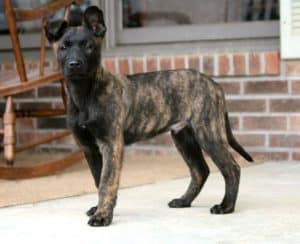
If you’re looking for some reputable Dutch Shepherd breeders, look no further. Here I have put together a little list of USA-based breeders, all of whom you can contact through the website.
- Aachen Dutch Shepherds – These breeders have 30 years’ experience breeding Dutchies. They are proud to say that many have been used as working dogs – with the police, in search and rescue, and as guide dogs – as well as companion dogs.
- Vom Warsney – Located in South Carolina, Warsney specializes in breeding Malinois and Dutch Shepherds. Check out the website for pictures of current puppies or information on upcoming litters.
- Land of Oz – A small kennel in northeast Kansas that specializes in breeding Dutch Shepherds and Malinois. You can see information on expected litters on the website.
As I already mentioned, most breeders will charge between $1000 – 1200 for a puppy.
Dutch Shepherd Rescues
Alternatively, there are lots of Dutch Shepherd rescues that need homes. Adoption fees will typically range from $50 – $500.
Below are few places to look if you want to adopt this beautiful breed:
- North American Dutch Shepherd Rescue – This foster-based organization is dedicated to rescuing and rehoming Dutch Shepherds. First, you will need to fill out an application, after which they will contact you and try to find a good match for you. They will also do an inspection of your home. They will then find the best way of getting the dog to you, depending on how close the dog is to you.
- Overstock – Here you can find Dutch Shepherds and Dutch Shepherd mixed breeds with information about the pup or adult along with pictures, and location.
- Adopt a Pet – This website allows you to type in your location and search by breed, sex, size, color, and age. You can also choose how far from your location you want to search for.
Conclusion
Dutch Shepherds are still a rare breed, but purebred and mixed breed Dutchies are becoming more popular as pets.
They are great for families, showing loyalty and affection, and they get on well with other animals as well as children. They need lots of exercises, so if you’re thinking of getting this dog, you should be prepared to get active! They are super smart, too, which means they often excel as police and service dogs.
If you want to get a Dutch Shepherd through a breeder, check out the list above and take a look through their current or upcoming litters. Alternatively, there are plenty of purebred and crossbreed rescues waiting for a home.
Though these dogs are a healthy breed, you should still check they’ve got health screenings for hips and eyes before buying or adopting.
So, thanks for sticking with us, and we wish you the best of luck in finding your Dutchie dogmate!

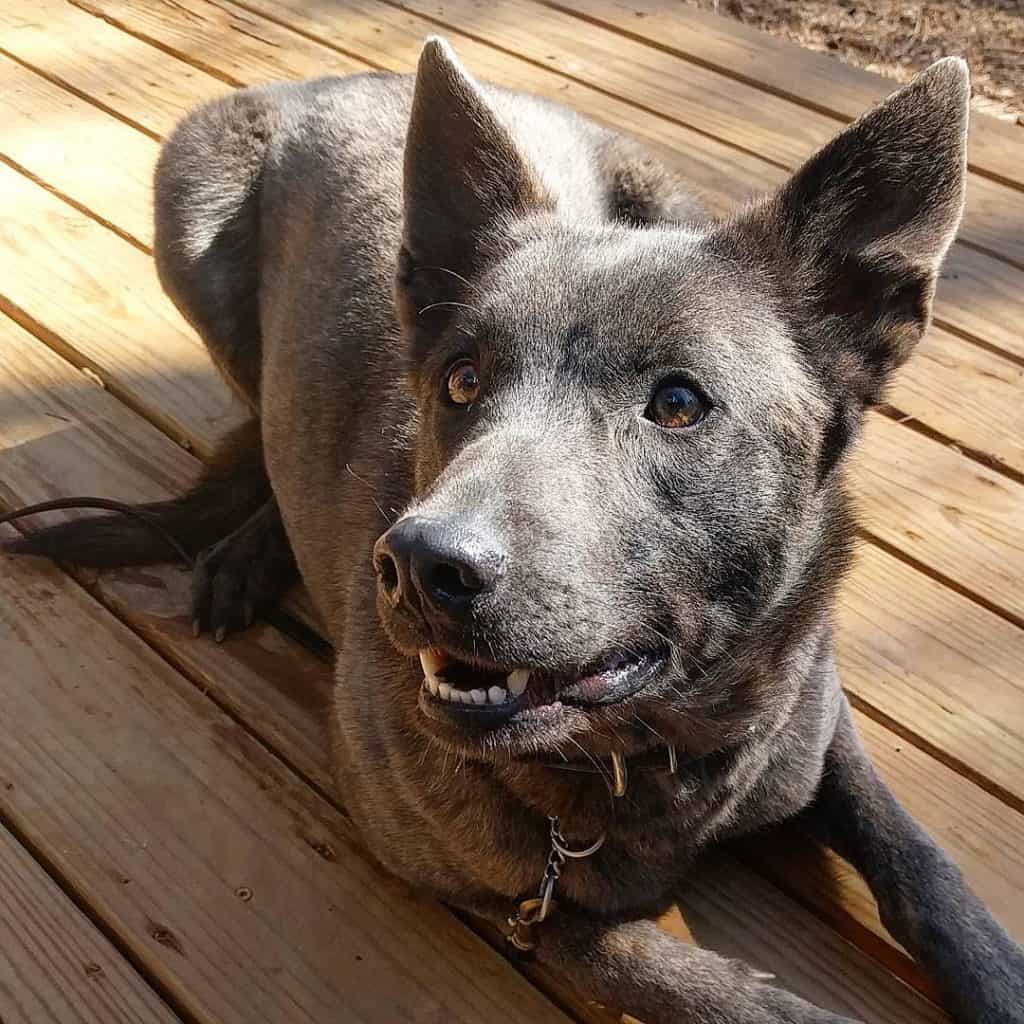

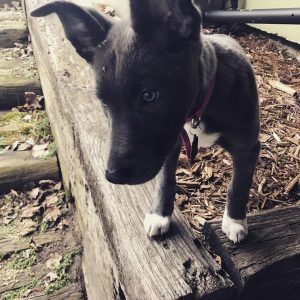

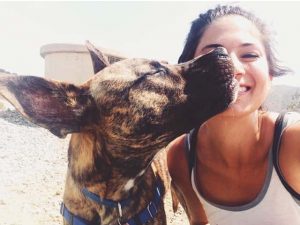
1 reply on “Dutch Shepherd: The Ultimate Guide”
Hi, you mentioned a few times how the DS gets along with other dogs and people well, this is impotent to me as my last two dogs a Alaskan Malamute ( hated other dogs- loved people) (Carolina Dog -GS mix hated other dogs – loves close family protective of everyone else)
I like the DS and found a breeder near me as well as some rescue mixes
I’m looking for a good dog to hike/bike with and be a great family companion all the kids are 19+
Thank you,
just want to make the best decision as it is a long commitment